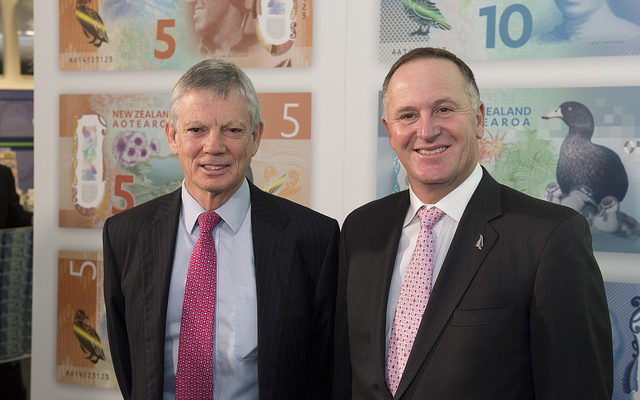
Governor Graeme Wheeler and Prime Minister John Key. Image via Reserve Bank of New Zealand
The New Zealand dollar fell sharply yesterday, losing 0.52% against the US dollar and was the weakest currency of the day after the RBNZ’s monetary policy meeting and press conference.
The Reserve Bank of New Zealand held the overnight cash rate steady at 1.75%, as widely forecast by economists polled. The RBNZ governor, Graeme Wheeler said that interest rates were likely to remain low but acknowledged the recent uptick in inflation. New Zealand’s quarterly inflation expectations had increased 1.9%, up from 1.7% while the quarterly CPI rose 0.4%, pushing the annual inflation rate to 1.3%.
Mr. Wheeler said that the central bank estimates the overnight cash rate to be around 2% by 2020, up 25 basis points in three years time, which longer than estimates by economists who expect the RBNZ to start hiking rates as early as 2018. The RBNZ has shifted from an easing bias last November to a neutral stance at yesterday’s meeting.
Official Cash Rate unchanged at 1.75 percent – https://t.co/MGtwsI6r8b
— Reserve Bank of NZ (@ReserveBankofNZ) February 8, 2017
Â
The RBNZ governor highlighted the risks of heightened outlook on the global economy which could be a drag on the economy. The RBNZ governor said that as a result the monetary policy would remain accommodative for a considerable period of time and that policy will adjust according to the risks and change the global outlook.
Mr. Wheeler also had some views on the US as he warned of potential inflation shocks to the world’s largest economy which could also trigger higher interest rates should the president follow through on this protectionist policies. Mr. Wheeler was referring to the proposed import tariffs that could spark an inflation rise would force the Fed into tightening monetary policy faster than expected.
Speaking of the exchange rate, the RBNZ’s statement said that while financial conditions in the economy have firmed on the back of long term interest rates rising and the continued increase in the currency’s exchange rate. The statement cautioned against this trend noting that a higher exchange rate would not be able to sustain balanced growth. Combining this with the low global inflation the exchange rate is expected to generate negative inflation in the tradables sector. Thus, the central said that “a decline in the exchange rate is needed.â€

